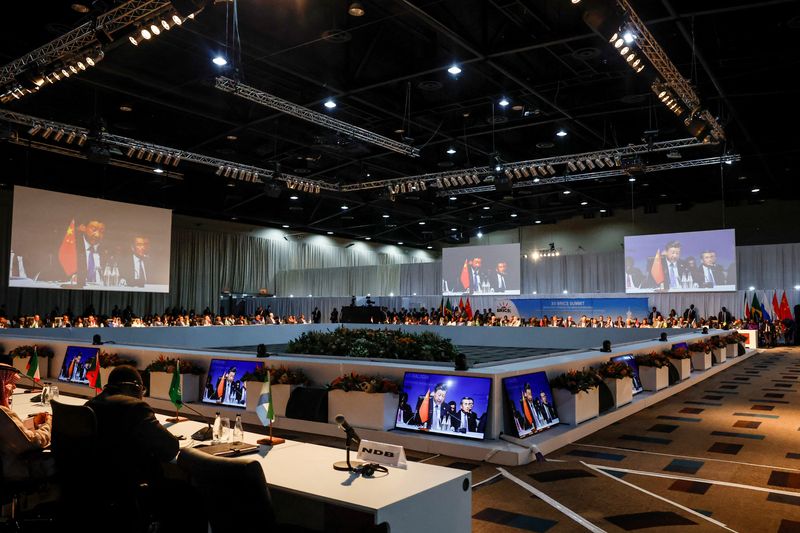By Tim Cocks
JOHANNESBURG (Reuters) - When a British economist coined the BRIC acronym two decades ago to denote Brazil, Russia, India and China, he didn't have in mind an alliance that would seek to challenge Western dominance in global affairs.
Jim O'Neill, then a Goldman Sachs (NYSE:GS) banker, was writing about investment opportunities in nations set to become among the world's top emerging markets.
The BRIC countries started meeting formally in 2014 to improve economic cooperation, and added South Africa in 2010 to become BRICS. The bloc now seems to have loftier geopolitical ambitions.
In a surprise decision at a summit this week in Johannesburg the group invited Saudi Arabia, Iran, Ethiopia, Egypt, Argentina and the United Arab Emirates into the club.
The move is aimed at increasing BRICS' clout as a champion of so-called Global South nations, many of which feel unfairly treated by international institutions dominated by the United States and other wealthy Western nations.
But expansion will likely mean more disagreements in a club that already struggles to make decisions because of the need for consensus. Even a joint declaration on expansion got stuck in eleventh-hour negotiations on Wednesday over the criteria for admitting new members.
"It's definitely going to be a problem if they are going to do everything by consensus. You need to change the model ... to majority vote," said Patrick Lukusa, a specialist in international cooperation at Johannesburg's University of the Witwatersrand.
"There are already differences between the five on the common currency. What happens if you have 10 more?"
'POLITICAL POLARISATION'
Pledges by BRICS leaders to defend non-Western countries' interests are part of a gradual shift in emphasis by the group from economics to geopolitics.
"Make no mistake: this is not just about trade. This is about the fragmentation and political polarisation we are seeing in the world," said Daniel Silke, director of the South Africa-based Political Futures consultancy, noting that China had cited threats of a new Cold War with Washington as a reason to expand.
Yet BRICS nations have a long way to go to transform themselves into a unified global organisation that can effectively challenge Western domination of international bodies such as the United Nations, the International Monetary Fund or the World Bank.
Its heavyweight members, China and India, are often at odds: New Delhi is more friendly to the West and has military deals with the United States, while it is in sometimes violent conflict with Beijing over their Himalayan border.
For Russian President Vladimir Putin the bloc is a forum to jab at the West that has sought to isolate Moscow over its invasion of Ukraine. In a videolink address on Thursday, he took aim at Western powers whose "neo-liberalism" he said threatened the emergence of a multi-polar world where no one country or bloc dominated.
His remarks appeared to contradict Brazilian President Luiz Inacio Lula da Silva, who said in a social media broadcast while at the summit on Tuesday that BRICS was not meant "to be a counterpoint to the G7, G20 or the United States."
Lula also reiterated at the summit Brazil's position of "defending sovereignty (and) territorial integrity" of countries - an apparent swipe at Russia over its invasion of Ukraine.
And he mooted the idea of a common currency for trade and investment between BRICS nations, something other members are not keen on, though they all share a desire to reduce their dependence on the U.S. dollar.
'ASPIRATIONAL HYPE'
The framework for BRICS to become more like an actual organisation is "in the process of being constructed, but they have a long way to go," said Tom Lodge, professor of peace and conflict studies at the University of Limerick.
The New Development Bank (NDB), set up by BRICS countries in 2015 as an alternative to the IMF and World Bank, has promised to increase lending in local currencies as a means to reduce members' vulnerability to dollar exchange rate fluctuations. But of nearly $33 billion in loans approved by the NDB, two-thirds were in dollars, an April investor presentation showed.
"An awful lot of the hype about BRICS is aspirational," Lodge said. "(If) they want a rebalancing of economic power and credit institutions not controled by Western countries, BRICS has achieved very little frankly towards that goal."
The addition of cash-rich petrostates to BRICS could bring in much needed liquidity for establishments like the NDB, said Gustavo de Carvalho, senior researcher at the South African Institute of International Affairs think tank.
But as the sometimes rancorous debates at the Group of Seven (G7) richest democracies show, building cohesion requires more than just money.

"It's too soon to tell if BRICS is going to be formed into an alliance," Carvalho said, noting that existing BRICS members often don't vote the same way at the United Nations.
"If this is not well-thought-out ... the risks of becoming very diluted like a smaller G7 are very high."